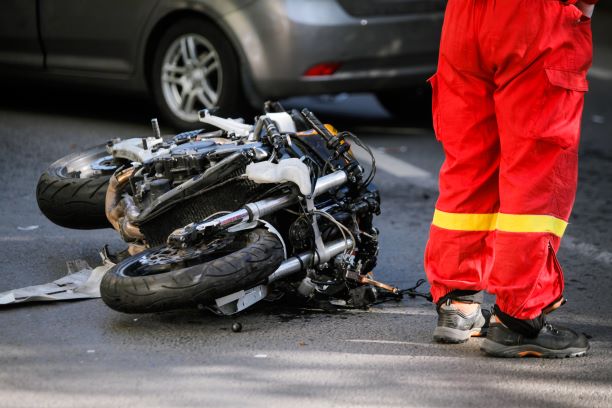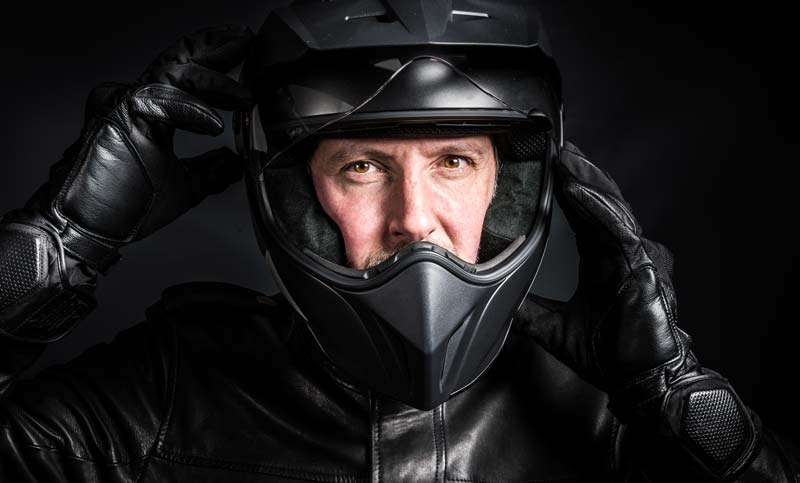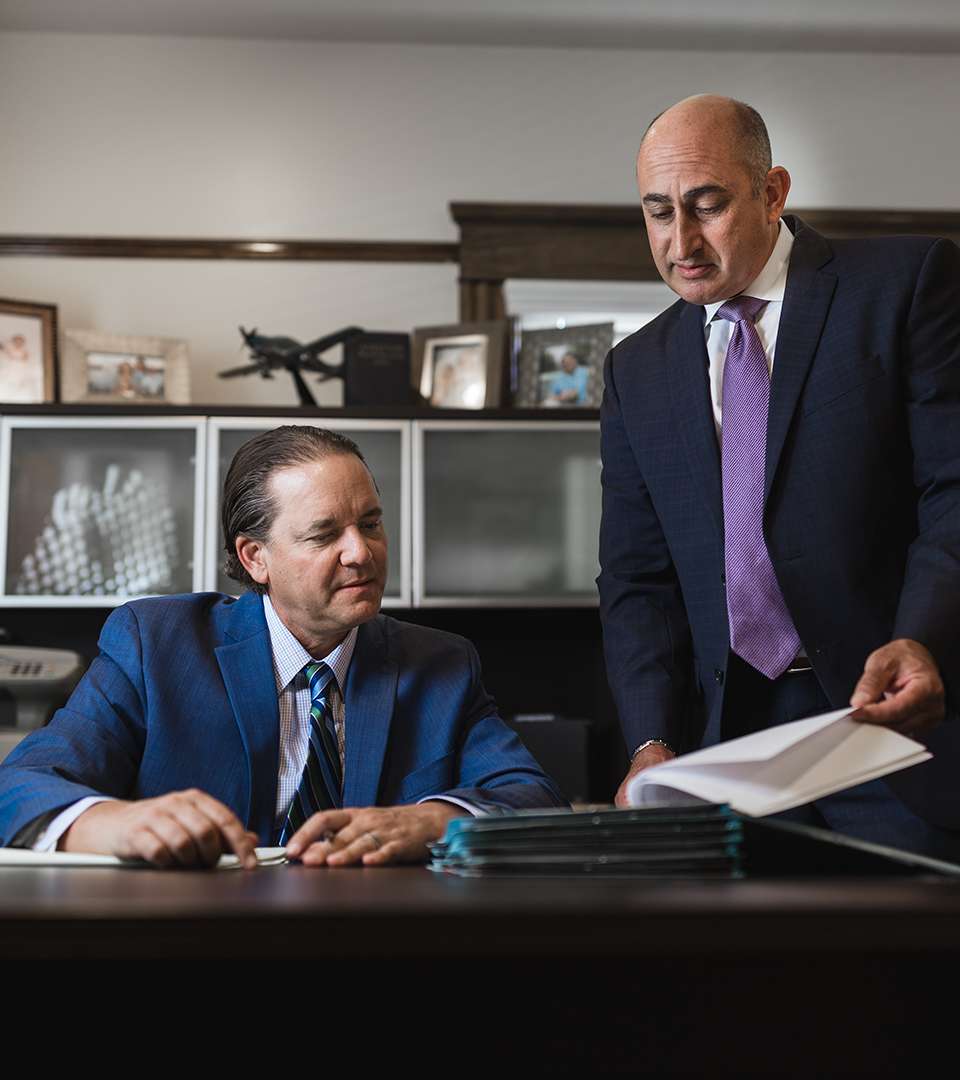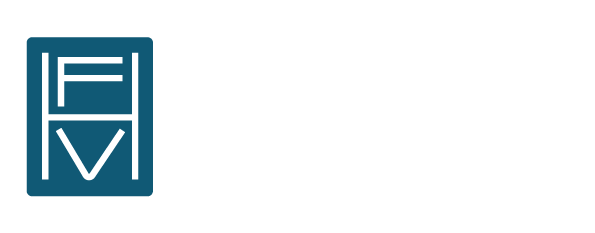
Motorcycle Accidents
Fresno Motorcycle Accident Attorneys
Fighting for Motorcycle Accident Victims in California

Travel by motorcycle certainly has its advantages. These include the ability to somewhat bypass traffic, easy parking, and savings on gas. Let's face it – rolling down car windows, even in a convertible, is just not the same. But, riders are subject to very severe injuries when involved in accidents.
Even with protective gear, drivers of passenger vehicles can collide with motorcycle riders or force them off their bike at high speeds, causing irreversible injuries and often death.
On This Page:
- Common Motorcycle Injuries
- What Victims Can Expect in Their Case
- Determining Liability in the Opposing Party
- What to Do After a Motorcycle Accident
- How Long Do I Have to File a Claim After a Motorcycle Accident in California?
- Is the Government Responsible for My Motorcycle Accident?
- What Are the Most Common Causes of Motorcycle Accidents?
- Do You Have to Wear a Motorcycle Helmet in California?
- Navigating Fresno Traffic: Risks & Precautions
- How Our Motorcycle Accident Attorney in Fresno Can Help You
If you were the victim of carelessness, recklessness, or negligence of a passenger vehicle driver, contact our firm for help by calling our motorcycle accident attorney in Fresno at (559) 900-1280!
Common Motorcycle Injuries
Motorcycle riders know the potential dangers they face on the road. Despite taking every precaution, the actions of other drivers and poor road conditions can lead to severe accidents, with injuries that can have lasting impacts. According to the National Highway Transportation and Safety Administration (NHTSA), from 2008 to 2017, motorcycle fatalities numbered 48,727, with 5,172 in 2017 alone. Understanding common injuries can help motorcyclists take extra steps to protect themselves on the road.
Head and Brain Injuries
Head injuries are among the most severe consequences of motorcycle accidents. These injuries range from concussions to traumatic brain injuries (TBIs) and skull fractures. The brain, one of the body’s most vital organs, can suffer devastating effects when it swells due to injury. The NHTSA reports that helmets saved approximately 1,859 lives in 2016 and could have saved an additional 802 if all riders had worn helmets. Wearing a helmet complies with California law and significantly reduces the risk of fatal injuries in an accident.
Road Rash
Road rash is a common injury resulting from a motorcyclist sliding across the pavement after being thrown from their bike. Protective clothing like leather and denim adds a layer of defense, but severe cases can still lead to deep open wounds, skin irritations, infections, nerve damage, and scarring. Wearing the right gear is essential for reducing the impact of road rash injuries.
Spinal Injuries
Spinal cord injuries are another severe risk of motorcycle accidents. Because the spinal cord transmits signals from the brain to the body, any injury here can result in lasting consequences, including nerve damage and loss of mobility. Approximately 90% of motorcyclists with spinal injuries survive, though they often face life-altering symptoms. It’s crucial to seek immediate medical care, as spinal injuries may not show symptoms right away.
Foot, Leg, & Bone Fractures
Foot and leg injuries are the most common injuries among motorcyclists, with some cases resulting in amputation. However, fractures and broken bones occur more frequently, varying from mild fractures to complex breaks where bones shatter. These injuries often require extensive recovery and rehabilitation.
What Victims Can Expect in Their Case
While no outcome can ever be guaranteed, and it will always depend on the certain circumstances of your case, victims of motorcycle accidents tend to suffer the most and are therefore eligible for a higher level of compensation. This, of course, will also depend on whether or not lives are lost in the event.
Motorcycle victims, or the family of the victim, are often compensated for:
- Pain and suffering
- Disfigurement
- Loss of limb
- Loss of wages, present and future
- Loss of consortium
- Loss of companionship or guidance
- Punitive damages for reckless endangerment
Remember, motorcyclists in California, like other states, may face specific legal challenges when pursuing a motorcycle accident claim.
Here are some common legal challenges motorcyclists might encounter in California:
- Bias and Stereotypes: Motorcyclists may face bias and stereotypes that assume they are inherently reckless or at fault in accidents. Overcoming these biases can be a challenge when presenting a case.
- Lane Splitting: California is one of the few states where lane splitting (riding a motorcycle between lanes of traffic) is legal under certain conditions. However, even when done legally, some insurance adjusters or opposing parties may use this as an argument against the motorcyclist.
- Helmet Use: California has a mandatory helmet law. Failure to wear a helmet may affect a motorcyclist's ability to recover damages, even if the lack of a helmet did not directly contribute to the accident.
- Comparative Negligence: California follows a comparative negligence system, which means that if the motorcyclist is found partially at fault for the accident, their compensation may be reduced proportionally. Insurance companies may try to argue that the motorcyclist was partially responsible for the accident.
- Limited Insurance Coverage: Motorcyclists may have limited insurance coverage, and not all drivers carry sufficient coverage. In accidents involving uninsured or underinsured motorists, motorcyclists may face challenges in recovering adequate compensation.
- Difficulty in Establishing Liability: Proving liability can be challenging in any accident case, but it can be especially so in motorcycle accidents. Gathering evidence, witness statements, and reconstructing the accident scene may be more complex for motorcycles.
- Injuries and Medical Costs: Motorcyclists often sustain more severe injuries compared to occupants of cars in accidents. The high medical costs associated with these injuries can be a challenge, especially if the at-fault party's insurance coverage is insufficient.
- Time Limits (Statute of Limitations): In California, there is a time limit within which a personal injury claim must be filed, known as the statute of limitations. Motorcyclists need to be aware of these time limits to ensure their right to pursue a claim is preserved.
- Documentation and Witnesses: Gathering evidence, taking photographs, and securing witness statements promptly after the accident are crucial. However, due to the nature of motorcycle accidents, these tasks may be more challenging compared to accidents involving only cars.
It's also important for victims to understand their rights under state law, especially concerning insurance requirements and the procedural aspects of claims. This understanding typically forms the foundation for navigating the legal landscape and securing fair compensation.
Determining Liability in the Opposing Party
Motorists are often found liable in motorcycle accidents for various reasons. These reasons stem from the dynamics of motorcycle-vehicle interactions as well as some common human behaviors.
Here are some reasons why motorists may be held liable in motorcycle accidents:
- Failure to Yield: Motorists may be at fault if they fail to yield the right of way to a motorcycle when required, such as at intersections or when merging.
- Negligent Lane Changes: Motorists may cause accidents by not checking blind spots or signaling properly when changing lanes, leading to collisions with motorcycles.
- Distracted Driving: Motorists who engage in activities such as texting, talking on the phone, or other distractions while driving are more likely to overlook motorcycles on the road, increasing the risk of accidents.
- Failure to Recognize Motorcycles: Some motorists may struggle to notice motorcycles due to their smaller size compared to other vehicles. This lack of awareness can result in collisions.
- Left-Turn Accidents: Left-turn accidents are common, where a motorist makes a left turn in front of an oncoming motorcycle, misjudging the distance and speed of the motorcycle.
- Speeding: Motorists traveling at high speeds may not have enough time to react to motorcycles or accurately judge their speed, leading to collisions.
- Driving Under the Influence: If a motorist is under the influence of alcohol or drugs, their impaired judgment and reaction times can significantly increase the likelihood of accidents involving motorcycles.
- Following Too Closely: Tailgating or following a motorcycle too closely can reduce the motorist's reaction time and increase the risk of a rear-end collision.
In California, to succeed in a motorcycle accident case, an injured motorcyclist generally needs to prove the following elements to establish the liability of the at-fault party:
- Duty of Care: The injured motorcyclist must establish that the at-fault party (usually the other driver) owed a duty of care. This duty is the responsibility to operate their vehicle in a reasonably safe manner to avoid causing harm to others on the road.
- Breach of Duty: The motorcyclist needs to demonstrate that the at-fault party breached their duty of care. This could involve actions such as reckless driving, failure to yield, distracted driving, or other negligent behaviors that led to the accident.
- Causation: It must be shown that the breach of duty was a direct cause of the motorcycle accident and resulting injuries. Essentially, the motorcyclist needs to establish a clear connection between the at-fault party's actions and the harm suffered.
- Damages: The injured motorcyclist must provide evidence of actual damages, such as medical expenses, property damage, lost wages, pain and suffering, and any other losses resulting from the accident.
Keep in mind that California follows a comparative negligence system, meaning the injured party's own negligence may be considered. However, as long as the injured motorcyclist is not more than 50% at fault, they may still be eligible for compensation, though their recovery may be reduced based on their percentage of fault.
Successfully navigating the complexities of proving liability requires legal knowledge and strategic planning, often involving accident reconstruction experts and thorough documentation to build a robust case for compensation.
What to Do After a Motorcycle Accident

When it comes time to file a personal injury claim to recover damages for your motorcycle accident, it will be helpful to already have a number of actions completed. The following steps are important to enhance the amount of economic and non-economic damages you can receive from your settlement:
- Keep a record of everything pertaining to the accident. File all documents, invoices, receipts, and doctor bills.
- Take notes of how you are feeling and everything pertaining to the accident. Journaling this experience with dates may seem tedious right now, but it can prove invaluable when pursuing compensation.
- Do not discuss your case with anyone but your attorney. Be discreet even with loved ones. Absolutely do not post anything about the accident or case on social media.
Additionally, seeking immediate medical attention is essential. Some injuries may not be immediately apparent, and documenting them promptly ensures they are included in your medical record, establishing a clear link between the accident and subsequent treatment. Engaging with your legal representative early on can provide the guidance needed to avoid common pitfalls and strengthen your position in negotiation or litigation.
How Long Do I Have to File a Claim After a Motorcycle Accident in California?
In California, the statute of limitations for filing a personal injury claim after a motorcycle accident is generally two years from the date of the accident. This means you have two years from the accident date to file a claim in court or settle your case outside of court.
However, there are exceptions to this deadline. For instance, if the at-fault party is a government entity, you may be required to file a claim with the government agency within six months of the accident, before proceeding with a lawsuit.
Please note, waiting too long to file a claim can result in your case being dismissed and you being unable to recover compensation for your injuries.
Call (559) 900-1280 today to speak with our Fresno motorcycle accident attorneys about your accident. Once we’ve conducted your free consultation, we will fight vigorously for what you deserve.
Navigating Fresno Traffic: Risks & Precautions
The urban layout and traffic patterns in Fresno can present unique challenges for motorcyclists. With densely populated areas and significant daily commutes, motorcyclists must navigate through busy streets and highways such as Highway 41 and 99. These roads, while important for transportation, also see a considerable number of interactions between different vehicle types, thereby increasing the risk of accidents if drivers are not attentive.
Local authorities in Fresno have instituted various measures to enhance road safety for all users, including motorcyclists. However, individual awareness and responsible riding remain paramount. Riders should stay extra vigilant in these areas, respecting speed limits and avoiding risky maneuvers like aggressive lane splitting. The presence of intersections and crosswalks in these densely trafficked areas necessitates additional caution, as these are frequent sites for accidents involving motorcycles.
How Our Motorcycle Accident Attorney in Fresno Can Help You
We can assist you throughout the entire process by:
- Thorough Investigation: We will execute a thorough investigation into the circumstances of your motorcycle accident. This includes collecting evidence like police reports, witness statements, accident scene photographs, and medical records. We will analyze the accident from every angle to identify all the parties accountable for your injuries, ensuring that no detail is overlooked.
- Determining Full Compensation: Motorcycle accidents often result in significant injuries, medical bills, lost wages, and emotional distress. We will carefully evaluate the full extent of your damages, which includes both current and future medical costs, lost earnings, pain and suffering, and any long-term effects of your injuries. We will ensure that every aspect of your claim is accounted for and that you obtain the compensation you deserve.
- Insurance Negotiations: Insurance companies often try to settle claims fast, sometimes offering far less than what you're entitled to. We will address all negotiations with the insurance companies to ensure you aren't exploited. We know how to deal with insurance tactics and will fight to secure a fair settlement that reflects the true value of your case.
- Court Representation: If an amicable settlement cannot be achieved, we are fully ready to take your case to court. We will fight aggressively on your behalf, presenting a strong case and ensuring that your voice is heard. We are committed to obtaining the best possible outcome for you through settlement or litigation.
- Peace of Mind: After a motorcycle accident, the last thing you should worry about is handling complex legal matters. We take on the burden of your legal case so you can focus on what matters most—your recovery.
- Ongoing Communication and Support: Throughout the legal process, we will keep you well-informed about the status of your case and any important updates. We will always be available to answer your questions or concerns.
Our Wins
Our Fresno Personal Injury Lawyers Will Fight to Recover What You're OwedAccording to the San Gabriel Valley Tribune, accident fatalities are around 28 times higher when a motorcycle is involved than when the accident involves automobiles only. In order to pursue a wrongful death claim for a loved one whose life was lost to a motorcycle accident, negligence must be established. In California, you will need to prove the following four elements for the accident to be classified as wrongful death:
- Duty of care - You must be able to prove that the other driver owed your loved one a duty of care.
- The duty of care was breached - You will also need to show that the person intentionally, recklessly, or negligently breached the duty of care.
- This breach of duty resulted in your loved one’s death - This will require an autopsy report among other elements.
- This death resulted in financial damages - You will need to work with a lawyer to not only prove the above elements, but that you are entitled to financial recovery for the loss of your loved one’s life
-
$750,000
Rear-End Collision
Multiple Car Pile Up Results in $750,000 Recovery for Client.
- $300,000 Uninsured Motorist Claim
-
Vehicle Accident
An injured driver and passenger of a vehicle were T-boned by an uninsured driver. FHV’s clients were able to pay their hospital bills and other medical bills, while still receiving compensation for their pain and suffering.
- $100,000 Rear-End Collision
- $100,000 Drunk Driving Accident

FAQs About Motorcycle Accidents
Is the Government Responsible for My Motorcycle Accident?
If you were involved in a single-vehicle accident as a motorcyclist, there is a chance that the state or county government may be responsible. If the cause of your accident was an unsafe road condition caused by the negligence of a government agency, it is imperative that you act quickly and speak with an attorney.
What Are the Most Common Causes of Motorcycle Accidents?
Any momentary act of distraction on the part of a car, truck, or another motor vehicle can result in a serious accident with a motorcyclist. Therefore, the most common cause of a motorcycle accident is distracted driving. Some other common causes, especially in the Fresno, CA area, include:
- Speeding
- Aggressive driving
- Drivers under the influence of alcohol or drugs
Environmental factors such as poorly maintained roads, inadequate signage, or hazardous weather conditions, particularly common in the Fresno region, can further amplify these risk factors. Recognizing these elements helps both riders and legal professionals focus their defensive strategy, whether through awareness campaigns or legal actions aimed at holding negligent entities accountable.
Do You Have to Wear a Motorcycle Helmet in California?
In California, anyone riding a motorcycle is required to wear a motorcycle helmet. It also must adhere to federal DOT safety requirements. Choosing not to wear a helmet is illegal in California. You could get a year of probation and/or a fine of up to $250. Not only that, but if you are in an accident that isn't your fault and you aren't wearing a helmet, it can be difficult to get the compensation you deserve.
Helmet use not only complies with state laws but also significantly mitigates injury severity, supporting a safer ride. Understanding and adhering to these safety mandates not only ensures legal compliance but fosters a culture of safety among motorcyclists, reducing overall accident fatality and injury rates.
How Will Comparative Negligence Impact My Case?
California holds to comparative negligence standards in personal injury cases. This means that the jury can take into consideration negligence of both parties when assessing negligence.
When a motorcycle rider is injured in an accident, the rider could possibly bear some of the blame for the collision. Even if you, as the motorcyclist, are partially responsible, under the state of California law, you can still seek financial recovery for your damages.
Contact Our Motorcycle Accident Attorney in Fresno Today
If you've been involved in a motorcycle accident, don't wait to get the legal support you need. Our Fresno motorcycle accident attorneys are here to help you navigate the complex legal process, ensure your rights are well protected, and fight for the compensation you rightfully deserve. Whether you're dealing with medical bills, lost wages, or insurance claims, we are committed to providing personalized and dedicated representation. Contact us today, and let us guide you every step of the way toward a successful resolution.
Contact our Fresno motorcycle accident lawyer today to get started on pursuing justice.



